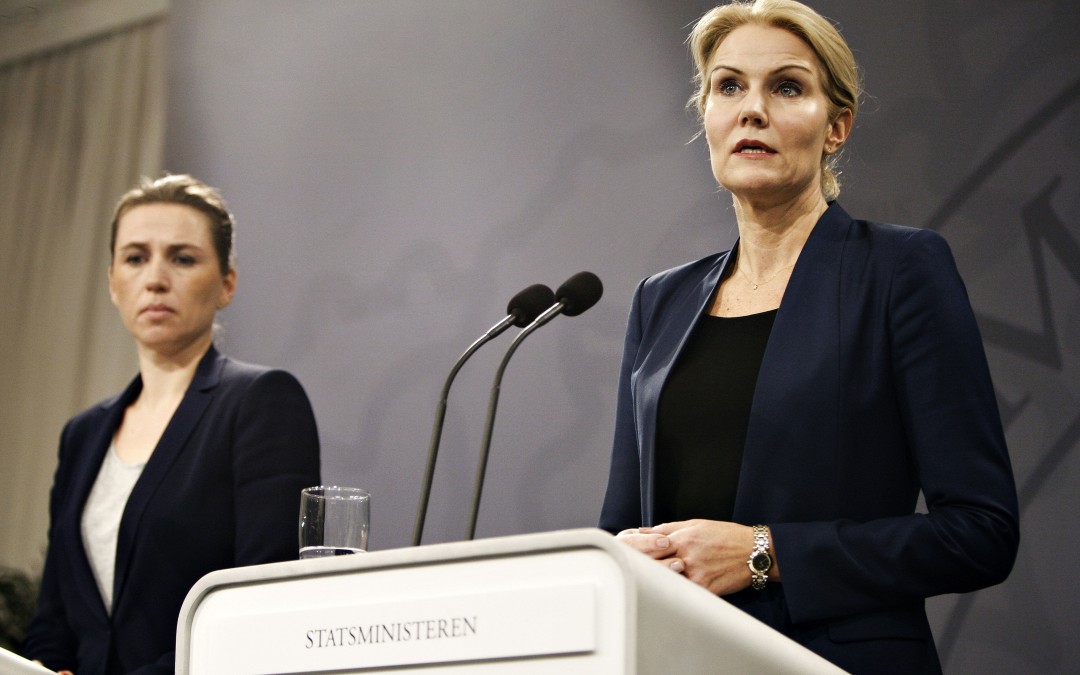IPI urges Denmark to reconsider decision to keep blasphemy law Government has opportunity to set strong example on blasphemy, criminal defamation
 Denmark’s Prime Minister Helle Thorning-Schmidt (R) and Justice Minister Mette Frederiksen address a news conference in Copenhagen on Feb. 15, 2015 on the recent shooting incidents in Copenhagen. REUTERS/Simon Laessoee/Scanpi
Denmark’s Prime Minister Helle Thorning-Schmidt (R) and Justice Minister Mette Frederiksen address a news conference in Copenhagen on Feb. 15, 2015 on the recent shooting incidents in Copenhagen. REUTERS/Simon Laessoee/Scanpi
VIENNA, Mar 9, 2015 – Denmark should set an example on freedom of expression by repealing its criminal defamation and blasphemy laws, the International Press Institute (IPI) said today.
Danish Justice Minister Mette Frederiksen announced at the end of February that the government would not seek repeal of the country’s blasphemy law. Art. 140 of the Danish Criminal Code punishes mocking a religion or religious doctrine with up to four months in prison.
According to media accounts, Frederiksen based the decision on a recent report issued by Denmark’s Criminal Law Council (Straffelovrådet), which had been asked to examine the issue in 2011. The report concluded that Art. 140 did not forbid sharp criticism of religion and suggested that, in the event of repeal, it would be difficult for the state to prosecute public burnings of the Bible or Koran.
“IPI is disappointed in the Danish government’s decision not to seek repeal of Art. 140, which is an outdated provision that has no place – and no logic – in a pluralist, democratic society,” said IPI Director of Press Freedom Programmes Scott Griffen. “Even if it is convinced that maintaining blasphemy laws will not harm freedom of expression or the press at home, Denmark should consider the symbolic value that such provisions have. We urge Denmark, given its reputation for free speech, as well as recent events, to set a stronger example for the rest of the world by reconsidering this decision.”
In response to the reported conclusions of the CLC, Griffen added that it was not clear why actions such as the burning of holy books could not be prosecuted under general prohibitions against the disturbance of public order or incitement to violence.
According to IPI research, Denmark is one of 14 EU states that maintain criminal blasphemy or religious insult laws, running contrary to the recommendations of the U.N. Human Rights Committee as well as the Representative on Freedom of the Media of the OSCE. Several states have debated repeal in the aftermath of the Charlie Hebdo attacks, with the Irish government expected to hold a referendum on repealing its constitutional ban on blasphemy in the near future.
Art. 140 is not the only problematic criminal law for freedom of expression on Denmark’s books, however. As highlighted in IPI’s recent “Out of Balance” report on defamation laws in the EU, defamation and insult are still considered criminal offences under Arts. 267 and 268 of the Danish Criminal Code. Both defamation and insult are punished with up to two years behind bars, “despite firm international consensus against the possibility of imprisonment in defamation cases,” Griffen noted.
He continued: “Even beyond the question of imprisonment, the notion that defamation cases should be a civil matter only, so as to reduce the possibility of self-censorhip, has found increasing favour among courts and international human-rights bodies. Here, too, Denmark should set a better standard by repealing all criminal provisions related to the protection of honour.”
The OSCE Representative on Freedom of the Media made a similar call last year after three journalists working for the Danish public broadcaster were sentenced to more than €30,000 in criminal fines for defamation.
































